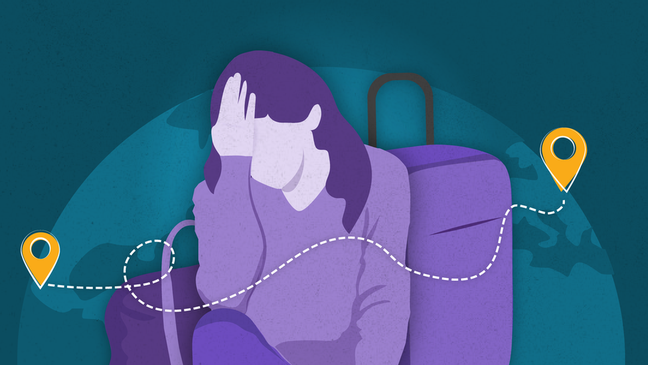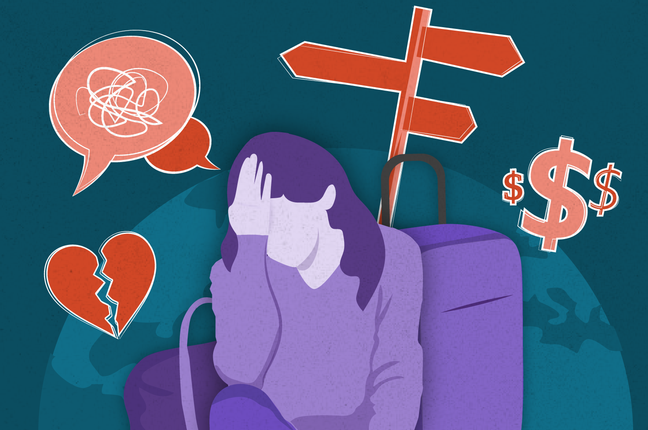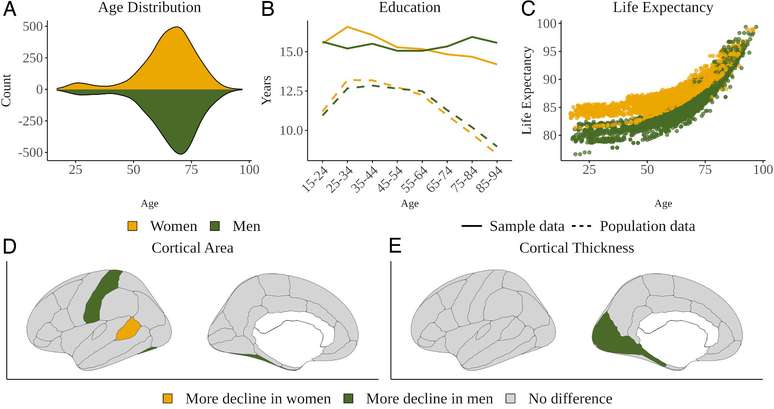Symptoms of the syndrome can confuse the diagnosis with depression or post-traumatic stress.

“You shouldn’t expel people from your land or country, not by force”, said the Argentine poet Juan Gelman (1930-2014).
But there are about 281 million international migrants in the world (3.6% of the world population), according to UN data from 2020.
Some people emigrate because they want to, but others are forced to emigrate. At the end of 2019, more than 79.5 million people had been forcibly displaced, according to UNHCR, the United Nations Refugee Agency.
Like it or not, migrants can feel, as Gelman puts it, a “monstrous plant” with roots thousands of miles away from the stem and leaves.
And there will always be circumstances, upon arrival at your destination, which will reduce or aggravate this situation. All of this undoubtedly has repercussions on mental health.
The line between mental health and disorder
Spanish psychiatrist Joseba Achotegui is secretary of the World Psychiatric Association and works on issues related to migration. She started noticing some changes in 2002.
“Borders were closed, tougher anti-migration policies were created, people no longer had access to documents and there was a huge struggle for survival,” he told BBC News Mundo, the news service in BBC Spanish language.
This new situation had an impact on how patients came to consult him. “They were helpless, scared, they couldn’t go on,” she said.
In particular, he noted that many migrants going through difficult situations have “a very intense, chronic and multiple stress response pattern”. Achotegui called this condition “Ulysses syndrome”.
The psychiatrist clarifies that this is not a pathology, since “stress and bereavement are normal in life”, but underlines the peculiarity of the syndrome that leaves the migrant, again, on a border – not geographic, but psychological, between mental health and disorder.
Migratory pain x Ulysses syndrome
We usually associate the word “mourning” with the feeling that arises after the death of a loved one. But psychologists refer the term to any loss suffered by the human being, such as the abandonment of work, the separation of a couple or changes in our body.
“Whenever we experience loss, we have to get used to living without what we had and adapt to the new situation. In other words, we have to work on bereavement,” explains Spanish psychologist Celia Arroyo, a specialist in migratory bereavement.
Therefore, migratory bereavement is associated with this great change in a person’s life. But it has characteristics that make it special, as it is a “partial, recurring and multiple” bereavement.

Partial because it is not a total loss, like someone’s death; recurring because, like any trip, it can be reopened by communicating with the country or simply by looking at a photograph on Instagram; and multiple, because it is not only one thing that is lost, but many.
Joseba Achotegui has grouped these defeats into seven categories.
The most obvious is often the loss of family and loved ones. There is also the loss of social status, which, according to Arroyo, usually occurs with the condition of a migrant, but if, moreover, “the country is xenophobic, great adversities arise”.
Another mourning for the migrant is the loss of land: missing, for example, a mountainous landscape or sunny days.
Added to this is the mourning for the language, which will be stronger in cases of migration to a country where another language is spoken. It can be a strong barrier, for example, for paperwork or for sending a simple email.
There is also the loss of cultural codes. It can represent something as simple as having no one to dance to a typical song with or drink a local drink from the country of origin.
And associated with this loss is the loss of contact with the group we belong to – those with whom we can speak with the same codes, who will understand our jargon and the way we see life.
Ulysses syndrome occurs when, in addition to having to deal with these normal pains, the migrant faces difficult conditions, according to Achotegui.

triggers
“When there are difficulties or the person is rejected in the society that welcomes him, this syndrome can occur,” explains Guillermo Fauce, professor of psychology at the Complutense University of Madrid, Spain, and president of the organization Psychology without borders.
Arriving in a new country with a stable job is very different from having no security; as well as having or not guaranteed accommodation and meals, or entering with a visa or legal status to be defined. Having or not having certain conditions adds points and stress.
“The rejection that can cause the most impact is not having documents or not being able to access certain resources,” says Fauce.
Achotegui explains that this situation makes migrants unable to move forward, generating tensions and survival problems, another trigger of the syndrome.
We can add to the picture not having people around us to offer support, not only material (where to live, eat and sleep), but also emotional. “Many migrants suffer situations of loneliness, they are isolated”, underlines Achotegui.
Fauce points out that there is also a symbolic support which, when absent, becomes another trigger. It is about the recognition and understanding of the conditions of the migrant in his environment, “who is going through a complicated situation, going through many mourning and who is being offered a period of transition in the society that welcomed him”.

Sometimes you may think that “the worst” is over when you cross the border in bad condition. But, in the host country, the feeling of being powerless, without rights and the possible work and sexual abuse can give rise to a fourth trigger: fear.
The consulted experts add that this vulnerable situation can lead to Ulysses syndrome, especially among women.
What can happen and when do we need to be vigilant?
Achotegui explains that the symptoms can be the same as when going through a bad time: poor sleep, difficulty relaxing, muscle aches or headaches, boredom, nervousness and sadness.
Fauce points out that, on the one hand, the migrant can enter a sort of depressive and sad state, withdrawing into himself, and, on the other hand, he can become hyperactive and anxious, which ends up consuming energy.
This can confuse Ulysses syndrome with other mental illnesses, such as depression or post-traumatic stress, and end up being medicated. But in this case, when the obstacles that gave rise to the syndrome (availability of work, certain stability, less stress, etc.) are resolved, the syndrome disappears.
“If the migrant goes on, finds work and reaches a certain stability, but the symptoms persist, there is more to be evaluated and it is necessary to intervene in another way, because there may already be something else in the psychiatric plan, such as a depression, “explains Achotegui.

Therefore, when the malaise becomes permanent or prevents us from moving on with our life, the alarm must sound.
Other warning signs pointed out by Fauce are occasional tantrums, damage to social relationships or “taking shortcuts, such as drug or alcohol use, exorbitant expenses or risky sports.”
What to do or not to do
“It is essential to create a social support network, to maintain contact with other immigrants and to share housing,” emphasizes Celia Arroyo. For this it is good to look for migrants of the same nationality or specific support groups.
Achotegui says this carries “less risk of mental disorders,” but being too anchored in the community of origin can cause less progress. “If you don’t integrate into the host society, progress will be difficult. It’s a question of balance,” he explains.
In other words, the way is to preserve “the roots” with water, but without forgetting the leaves, which must remain where they can receive the sun.
Achotegui also recommends doing exercises and activities that reduce stress.
Fauce stresses that “radical cuts or drastic decisions do not work”, neither with regard to the country of origin nor the host country, as well as the relations that are created in the two countries.
Arroyo points out that while it is difficult to provide an accurate time, if the suffering is not reduced within three months of achieving stability, it is good to seek psychological help.
what others can do
The host society plays an important role, but those who have not experienced this situation may not understand what migratory bereavement means, nor the prolonged stress caused by Ulysses syndrome. So you may not know how to help, what to say, or what to do.
Celia Arroyo recommends that the migrant’s environment allows those in this situation to express themselves freely and talk about what is happening and how they feel.
“It is important not to minimize suffering, nor to generate false hopes” in the face of an uncertain future when, for example, visas and work do not arrive. As with any bereavement, you should avoid phrases such as “it will soon pass”, “it is not because of that”, “this is your fear” or “everything will end well”.
Achotegui suggests not to pity or victimize. “We must approach with respect and also with a certain admiration. The migrant is a strong person, a person who moves forward”.
On the other hand, it is important to respect their culture, mentality and worldview.
If the emotional connection with someone in this situation is difficult, Fauce reminds you that we have all suffered some loss. Therefore, connecting to that emotion that we have already had is a good exercise to empathize with the migrant.
And to believe that, as the Uruguayan Cristina Peri Rossi wrote, emigrating – leaving, in short – is always breaking in two.
– This text has been published originally in https://www.bbc.com/portuguese/geral-62571893
Source: Terra
Benjamin Smith is a fashion journalist and author at Gossipify, known for his coverage of the latest fashion trends and industry insights. He writes about clothing, shoes, accessories, and runway shows, providing in-depth analysis and unique perspectives. He’s respected for his ability to spot emerging designers and trends, and for providing practical fashion advice to readers.







